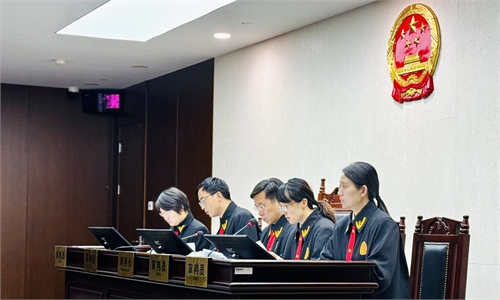China’s first ‘AI cheating’ case in video games publicly adjudicated; defendant sentenced to years of imprisonment for selling illegal AI plug-ins

rule of law (file photo) Photo: VCG
China's first "AI cheating" case in video games was publicly adjudicated on Monday at Yujiang District People's Court in Yingtan, East China's Jiangxi Province. The defendant was sentenced to three years in prison with a five-year probation, for profiting via illegally invading and controlling a computer system which disrupted video game's operation.The defendant, surnamed Wang, was found to have profited by creating and selling AI plug-in programs. He collaborated with others including Wan and Zhang in 2022 to develop plug-in programs. Upon completion, Wang utilized agents including Chen and Zhang for selling the programs, thereby making a profit from the sale of "AI cheating" gift card passwords. In total, Wang illegally obtained over 6.29 million yuan ($890,000), out of which he paid 840,000 yuan to Wan for development expenses and over 420,000 yuan to Zhang for production expenses.
According to police, the so-called game cheating refers to the use of third-party software to program game modifiers with specific functions. It mainly enhances the skills of game characters by tampering with the normal settings and rules of the game, allowing the characters to exhibit abilities beyond the usual limits. It is a form of cheating program that fundamentally disrupts a computer system.
In Wang's case, he was found to have used an "AI cheating" program to access visual data from multiple games without authorization, modified mouse data instructions processed in video games, and introduced features such as "auto-aim" and "automatic shooting," thereby disrupting the normal gaming environment. The program source code was founded to intercept mouse data instructions, calculate and analyze these instructions, and send the calculated results back to the computer's USB port, enabling automatic movement and clicking of the computer mouse pointer.
Wang was sentenced to three years in prison with a five-year probation and issued a fine. Confiscation of illegally obtained proceeds and tools used in the crime were forfeited and turned over to the state treasury. Any remaining personal illegal gains not yet confiscated will continue to be pursued. Following the verdict, Wang complied with the judgment and decided not to appeal.
According to Criminal Law of the People's Republic of China, providing specialized programs or tools for invading or illegally controlling computer information systems, or knowingly providing such programs or tools for others engaged in such illegal activities, constitutes the crime of providing programs or tools for invading or illegally controlling computer information systems when the circumstances are serious.
The court made the aforementioned judgment as Wang's provision of specialized programs or tools for invading or illegally controlling computer information systems, leading to substantial profits, committed a crime, and his confession and voluntary admission of guilt and the return of illegally obtained proceeds warranted a lighter punishment.
Global Times



